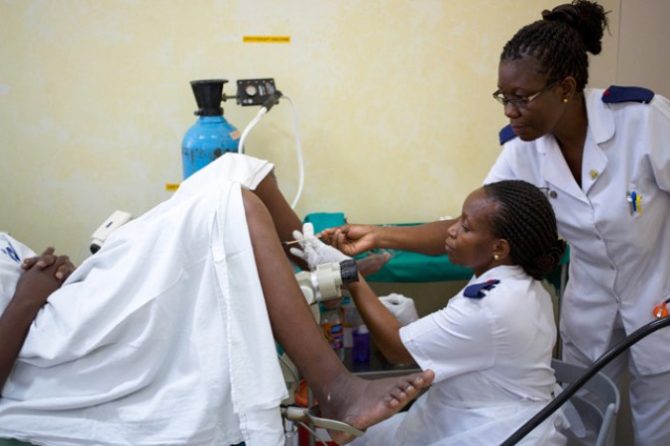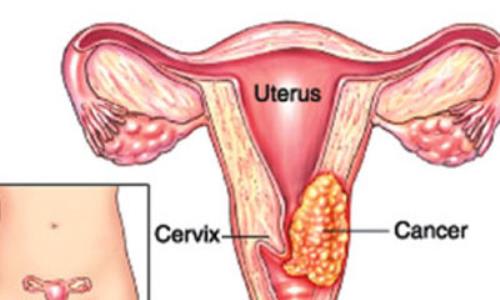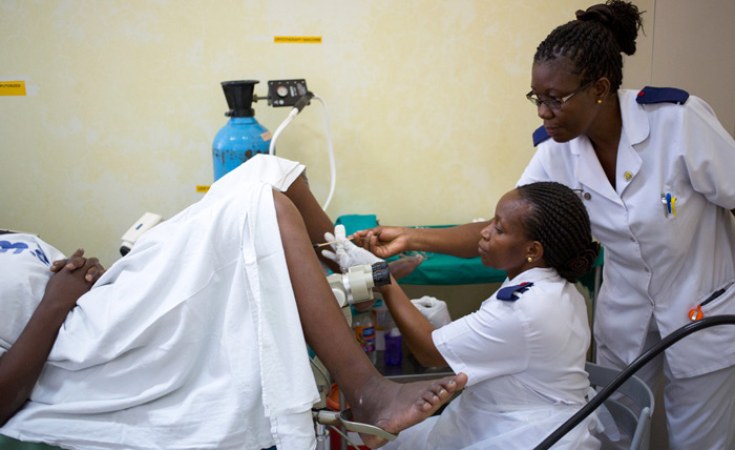
Cervical Cancer: Causes, Prevention, Treatment
Have you noticed any of the following;
Bleeding from your vagina when its not time for your normal menses, Bleeding from your vagina after sexual intercourse, Bleeding from your vagina after you have reached menopause (that is no bleeding for at least a year), then, let’s talk.
A lot of our ladies are not quite conversant with the knowledge of Cervical Cancer. It is becoming increasingly common among our women, in their 4th to 5th decade of life, and is only the 2nd most common cancer among women in Nigeria after Breast Cancer.
This cervical cancer affects over 570,000 women every year, out of which, more than half of these people die, mostly due to late presentation.
In Nigeria alone, there were over 14,000 documented cases & 10,000+ deaths from cervical cancer in 2018.
The good news is that Cervical Cancer is Preventable & also treatable when it is detected early. Our target is mainly at Prevention & Early detection of these cases.. We shouldn’t have to lose any more women to cervical cancer. We shouldn’t have to lose any more persons to preventable causes.
What is Cervical Cancer?
This refers to cancer of neck of the womb (cervix). Here, the cells here are growing without control. At a point they become so big, and sometimes if not managed becomes foul-smelling. Imagine having a big wound that does not heal inside your cervix.

What Causes Cervical Cancer?
Over 95% of Cervical cancers is caused by repeated infections from the Human Papilloma Virus (HPV). There are over 100 types of this virus, but the most important subtype that causes Cervical Cancer is the type 16 & 18.
Another strain of this virus (types 6 & 11) causes Genital warts, but we would talk about that some other time.
How Can I Get Infected with HPV?
The Human Papilloma Virus (HPV), which causes over 95% of cervical cancers is transmitted through Sexual Intercourse.
The major risk factors for contacting HPV are as follows;
- Early age at first sex: This means when a girl starts having sex at a very young age, like below 18. The risk increases with earlier age at first sex.
- Multiple Sexual Partners: this involves a lady who engage in sexual activities with many different men. What ladies of today would call body counts. The more the number of men in your life, the greater the risk.
- STDs: The presence of a sexually transmitted disease is a great risk for development of Cervical cancer.
How Do I Prevent HPV?
To prevent infections by HPV, there are important steps to follow, such as;
Lifestyle modifications are required, such as: Delay onset of sex, treat STIs, reduce number of sexual partners etc.
HPV Vaccination: This is the current practice which helps protect ladies & girls from being infected with HPV, & subsequent development of Cervical cancer or genital warts.
Young girls from 9 years of age & above are vaccinated with the HPV Vaccine, before the onset of their sexual lives. This protects them against the HPV infection.
Regular Cervical Screening; For women who are over the age of 21 years, and are sexually active. It is recommended for you to do pap smear 3 yearly or HPV DNA 5 yearly.
This screening is a great gift among friends/family members.
What is HPV Vaccination?
This is a form of immunization that protects the person against infection from HPV group of viruses depending on the type taken. It is similar to the immunization that we take at childhood against tetanus or polio. The HPV vaccination is taken 3 times apart for effective vaccination. Know that the HPV vaccination (tetravalent) also protects you against Genital warts).
How Much is the Cost of HPV Vaccination?
The cost of HPV Vaccination depends on the centre where it is being taken. The price ranges from 21k to 60k and it depends on if it is being subsidized or not. Click here to find out the cost of HPV Vaccination in your area.
Who Can Be Vaccinated for HPV?
There is this misconception that the HPV Vaccine is only meant for ladies. That’s far from the truth. Nowadays, males are advised to get HPV vaccination. That way, you protect yourself from being used as a reservoir in the transmission of HPV, and also protect yourself from genital warts.
What is PAP Smear?
PAP smear is a screening method used to check for abnormal cells in the cervix (womb). In this test, a soft brush is used to collect samples from the cervix, through the vagina, and then this samples are tested for the presence of abnormal cells.

It is not painful, and has no effects.
It is recommended for all women who are sexually active above the age of 21.
It helps to detect early cases of cervical cancer so that they can be managed & treated early.
How Do I Know If I Have Cervical Cancer?
If you see any of the following, suspect cervical cancer;
- Abnormal bleeding from your vagina when its not time for your normal menses
- bleeding from your vagina after sexual intercourse
- Bleeding from your vagina after you have reached menopause (that is no bleeding for at least a year)
How Can Cervical Cancer be Treated?
The options of treating cervical cancer depends on the stage at which it is detected. Available options includes;
- Surgery: the cancer mass is removed. This is only possible to achieve a cure, when the disease is not advanced.
- Chemotherapy: use of various Anticancer drugs to fight the cancer cells.
- Radiotherapy: Use of radiation to kill the bad cells.
- Combined: Any combination of the above method.
Remember: Cervical cancer is both preventable & treatable. Early detection is key to treatment.
You can pay for someone to ensure it is done
Don’t forget to vaccinate young girls against HPV!
So ask yourself have you screened for cervical cancer?
If you have any Questions? Pleas use the comment box below, and we would get back to you as soon as possible.
Leave a reply
Leave a reply